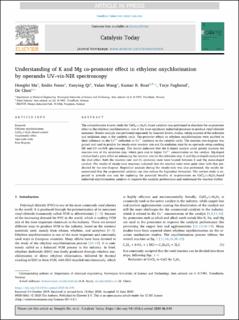| dc.contributor.author | Ma, Hongfei | |
| dc.contributor.author | Fenes, Endre | |
| dc.contributor.author | Qi, Yanying | |
| dc.contributor.author | Wang, Yalan | |
| dc.contributor.author | Rout, Kumar Ranjan | |
| dc.contributor.author | Fuglerud, Terje | |
| dc.contributor.author | Chen, De | |
| dc.date.accessioned | 2020-10-29T09:43:39Z | |
| dc.date.available | 2020-10-29T09:43:39Z | |
| dc.date.created | 2020-09-15T15:21:24Z | |
| dc.date.issued | 2020 | |
| dc.identifier.citation | Catalysis Today. 2020, . | en_US |
| dc.identifier.issn | 0920-5861 | |
| dc.identifier.uri | https://hdl.handle.net/11250/2685629 | |
| dc.description.abstract | The comprehensive kinetic study for CuCl2/γ-Al2O3-based catalysts was performed to elucidate the co-promoter effect in the ethylene oxychlorination, one of the most significant industrial processes to produce vinyl chloride monomer. Kinetic analysis was performed separately by transient kinetic studies, taking account of the reduction and oxidation steps in the catalytic cycle. The promoter effects on ethylene oxychlorination were ascribed to their influence on the Cu2+ reduction or Cu+ oxidation in the catalytic cycle. The reaction rate-diagram was gained and used to predict the steady-state reaction rate and Cu oxidation state by an operando setup combing MS and UV–vis-NIR spectroscopy. The results indicated that the K-doped catalyst could greatly increase the reaction rate of the oxidation step, which gave rise to higher Cu2+ concentration on the catalyst. Mg-doped catalyst had a great effect on enhancing the reaction rate for the reduction step. K and Mg co-doped catalyst had the dual effect, both the reaction rate and Cu oxidation state were located between K and Mg mono-doped catalyst. The results of steady-state reactions indicated that the reaction rates were quite close with that predicated by the rate-diagram. Byproduct analysis during the steady-state was also performed, the results demonstrated that the co-promoted catalysts can also reduce the byproduct formation. The current study is expected to provide one way for exploring the potential benefits of co-promotion on CuCl2/γ-Al2O3-based industrial oxychlorination catalysts to improve the catalytic performance and understand the reaction further. | en_US |
| dc.language.iso | eng | en_US |
| dc.publisher | Elsevier | en_US |
| dc.rights | Navngivelse 4.0 Internasjonal | * |
| dc.rights.uri | http://creativecommons.org/licenses/by/4.0/deed.no | * |
| dc.subject | Rate-diagram | en_US |
| dc.subject | Operando study | en_US |
| dc.subject | Co-promoter effect | en_US |
| dc.subject | CuCl2/γ-Al2O3-based catalyst | en_US |
| dc.subject | Ethylene oxychlorination | en_US |
| dc.title | Understanding of K and Mg co-promoter effect in ethylene oxychlorination by operando UV–vis-NIR spectroscopy | en_US |
| dc.type | Peer reviewed | en_US |
| dc.type | Journal article | en_US |
| dc.description.version | publishedVersion | en_US |
| dc.rights.holder | © 2020 The Authors. Published by Elsevier B.V. This is an open access article under the CC BY license (http://creativecommons.org/licenses/BY/4.0/). | en_US |
| dc.source.pagenumber | 8 | en_US |
| dc.source.journal | Catalysis Today | en_US |
| dc.identifier.doi | 10.1016/j.cattod.2020.06.049 | |
| dc.identifier.cristin | 1830146 | |
| dc.relation.project | Norges forskningsråd: 237922 | en_US |
| cristin.ispublished | true | |
| cristin.fulltext | original | |
| cristin.qualitycode | 2 | |

